Related Research Articles

Ankara, historically known as Ancyra and Angora, is the capital of Turkey. Located in the central part of Anatolia, the city has a population of 4.5 million in its urban centre and over 5.6 million in Ankara Province, making it Turkey's second-largest city after Istanbul.

Şişli is one of the 39 districts of Istanbul, Turkey. Located on the European side of the city, it is bordered by Beşiktaş to the east, Sarıyer to the north, Eyüp and Kağıthane to the west, and Beyoğlu to the south. In 2009, Şişli had a population of 316,058.

Ottoman clothing or Ottoman fashion is the style and design of clothing worn by the Ottoman Turks.
The Cebeci Asri Cemetery is a cemetery located in the Cebeci quarter of central Ankara, Turkey serving multiple religions. It was the first modern burial place in the capital city, and is the final resting place of many prominent figures.
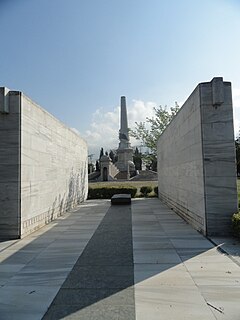
The Monument of Liberty or Monument of Eternal Liberty, located in the Şişli district of Istanbul, Turkey, is a memorial in honor of the soldiers killed defending the Ottoman parliament against reactionary monarchist forces during the 1909 countercoup, most notably in the 31 March Incident.

Christianity in Turkey has had a long history dating back to the 1st-century AD. In modern times the percentage of Christians in Turkey has declined from 20 to 25 percent in 1914 to 3–5.5 percent in 1927, to 0.3–0.4% today roughly translating to 200,000–320,000 devotees. Exact numbers are difficult to estimate as many Muslim converts to Christianity often hide their faith for fear of discrimination or familial pressure.

Turkey is a secular state in accordance with Article 24 of its constitution. Secularism in Turkey derives from Mustafa Kemal Atatürk's Six Arrows: republicanism, populism, laïcité, reformism, nationalism and statism. The Turkish government imposes some restrictions on Muslims and other religious groups, as well as Muslim religious expression in government offices and state-run institutions, including universities.

Religion in Istanbul covers the issue of religion in the city of Istanbul, Turkey.
Democratic initiative process is the name of the process in which the government of Prime Minister Recep Tayyip Erdoğan launched a project aiming to improve standards of democracy, freedoms and respect for human rights in Turkey. The project is called the Unity and Fraternity Project. Interior Minister Beşir Atalay stated the primary goals of the initiative as improving the democratic standards and to end terrorism in Turkey. "We will issue circulars in the short term, pass laws in the medium term, and make constitutional amendments in the long term and take required steps," Prime Minister Erdoğan said.
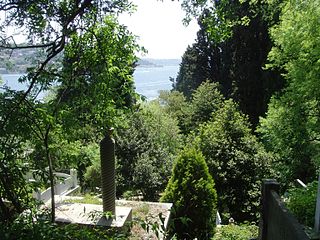
The Aşiyan Asri Cemetery is a burial ground situated on Aşiyan between the Bebek and Rumelihisarı neighborhoods of the European part of Istanbul, Turkey.

Papa Eftim I, was a Turkish bishop, who was the first Turkish Orthodox Patriarch of the Autocephalous Turkish Orthodox Patriarchate, an unrecognised Orthodox Christian denomination, that he founded. Eftim I had strong influences from Turkish nationalist ideology. He ruled as Patriarch from 1923 until 1962, when he resigned due to ill health. Keeping the title of honorary patriarch, he ordained his younger son as patriarch assuming the name Papa Eftim II.
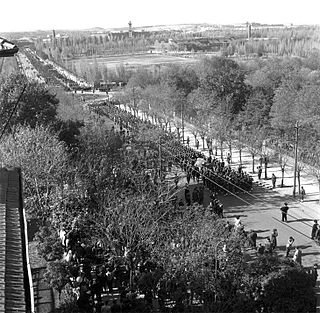
Mustafa Kemal Atatürk, first President of the Republic of Turkey, died at the Dolmabahçe Palace, his official residence in Istanbul, on 10 November 1938. His state funeral was held in the capital city of Ankara on 21 November, and was attended by dignitaries from seventeen nations. His body remained at the Ethnography Museum of Ankara until 10 November 1953, the fifteenth anniversary of his death, when his remains were carried to his final resting place at Anıtkabir.
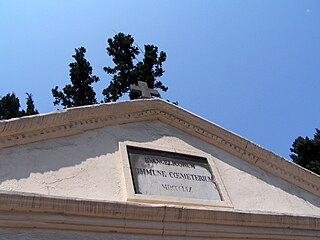
Feriköy Protestant Cemetery officially called Evangelicorum Commune Coemeterium is a Christian cemetery in Istanbul, Turkey. As the name of the cemetery indicates, it is the final resting place of Protestants residing in Istanbul. The cemetery is at Feriköy neighborhood in Şişli district of Istanbul, nearly 3 km (1.9 mi) north of Taksim Square.

Minorities in Turkey form a substantial part of the country's population, representing an estimated 25% to 30% of the population.
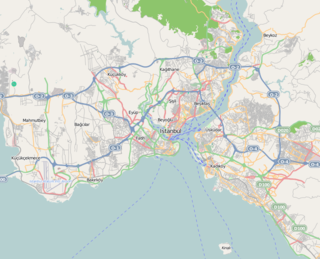
Şişli Greek Orthodox Cemetery , also known as Şişli Eastern Orthodox Cemetery, is a Christian cemetery in Istanbul, Turkey. The burial ground is the final resting place of people professing the Orthodox faith in Istanbul. The cemetery is located in Şişli district of Istanbul just across the Cevahir Mall.

Pangaltı Roman Catholic Cemetery, also known as Feriköy Latin Catholic Cemetery, is a historic Christian cemetery in Istanbul, Turkey. It is the largest Catholic cemetery in Istanbul. The cemetery is at Feriköy neighborhood in Şişli district of Istanbul, nearly 3 km (1.9 mi) north of Taksim Square. The main Protestant burial ground of the city; Feriköy Protestant Cemetery, Istanbul lies just across the Catholic cemetery. Two neighboring cemeteries are divided by a road; Abide-i Hürriyet avenue.

Pangaltı is one of the four neighborhoods within the Nişantaşı quarter of the Şişli district in Istanbul, Turkey.

The Eyüp Cemetery, aka Eyüp Sultan Cemetery, is a historic burial ground located in the Eyüp district, on the European side of Istanbul, Turkey. It is administered by the General Directorate of Foundations. One of the oldest and largest Muslim cemeteries in Istanbul, it hosts graves of Ottoman sultans and court members, grand viziers, high-ranked religious authorities, civil servants and military commanders as well as intellectuals, scientists, artists and poets.

The Ulus Ashkenazi Jewish Cemetery is a burial ground of the Ashkenazi Jewish community in Istanbul, Turkey. However, it is also used today for Sephardi burials due to overpopulation of the nearby Ulus Sephardi Jewish Cemetery, which is about 500 m (1,600 ft) north of the Ashkenazi Jewish Cemetery on the same street.

Mersin Interfaith Cemetery, is a burial ground in Mersin, Turkey. It is notable for being a common cemetery of all religions and includes graves of Muslims, Christians, and Jews.
References
- 1 2 3 "Villa fiyatına mezarlık". Sabah (in Turkish). 2010-09-07. Retrieved 2013-10-26.